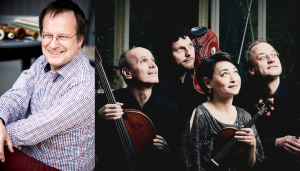
by the Ruysdael Quartet and Peter Holtslag (recorders)
It was hard work to make Songs of War & Peace. Selecting and musically understanding the songs from the Thirty Years’ War, especially the so completely different Bohemian songs. Imagining a 17th-century instrument (the recorder), with the styles that go with it, along with an ensemble that is largely rooted in Romanticism (the string quartet). And practically speaking, of course, there was the Covid crisis, which meant that the Czech Bennewitz Quartet had to be replaced at the very last minute by the Ruysdael Quartet. The quartet did a formidable job in the four concerts that were recorded by NPO Radio4. Master flutist Peter Holtslag will be taking this commissioned work to Germany next season, where he will play the German premiere at the ElbPhil. I am more than satisfied with the piece. Listen to it here the way it sounded at the premiere.
Songs of War & Peace is a suite for string quartet and recorder inspired by folk songs from the Thirty Years’ War, which gripped Europe at the beginning of the 17th century. Germans, Dutch, Spaniards, and Czechs fought for power and religious freedom on a scale never before seen during those chaotic and bloody years. For the Czechs, the wry outcome was the loss of their independence.
Songs of War & Peace is the musical expression of a warring Europe that proves to be topical again and again. Old battle songs, hymns and lamentations collide and merge into a contemporary portrayal of that war.
Songs of War & Peace consists of 5 parts in which the different aspects of the war can be heard: euphoria, destruction, loss, hope and bitter memories, and in which, for the good listener, numerous melodies of farmer, citizen and soldier can be recognized. Think of Dutch melodies like Nu drijven wy de Paus heraus, and iconic German melodies like Der grimmig Tod and O Heiland reiss der Himmel auf. A major role is also played by Bohemian religious music, the only heritage in which the Czech language was preserved after the devastating Bohemian defeat in November 1620, now 400 years ago…
The recorder-strings quartet combination is rare and embraces different stilistic periods. The flute stems from the harsh period of the war itself, the quartet from the Romantic nineteenth century when people reflected on that national past. The piece brings them together in a new sound world.
The Ruysdael Quartet developed in the masterly tradition of such quartets as the Amadeus, Hagen, Alban Berg and Mosaïques. It has made a name for itself in Europe by winning major awards such as the Alban Berg Prize and by their lauded performances of Russian music.
Peter Holtslag is, among other things, a specialist in the 17th-century repertoire, both as a performing musician with many CDs to his name and as a teacher at the Royal Academy and the Musikhochschule Hamburg.
On the program, the new work was preceded by Purcell, Fantasias, and Beethoven’s quartet, op. 18 no. 4 in c